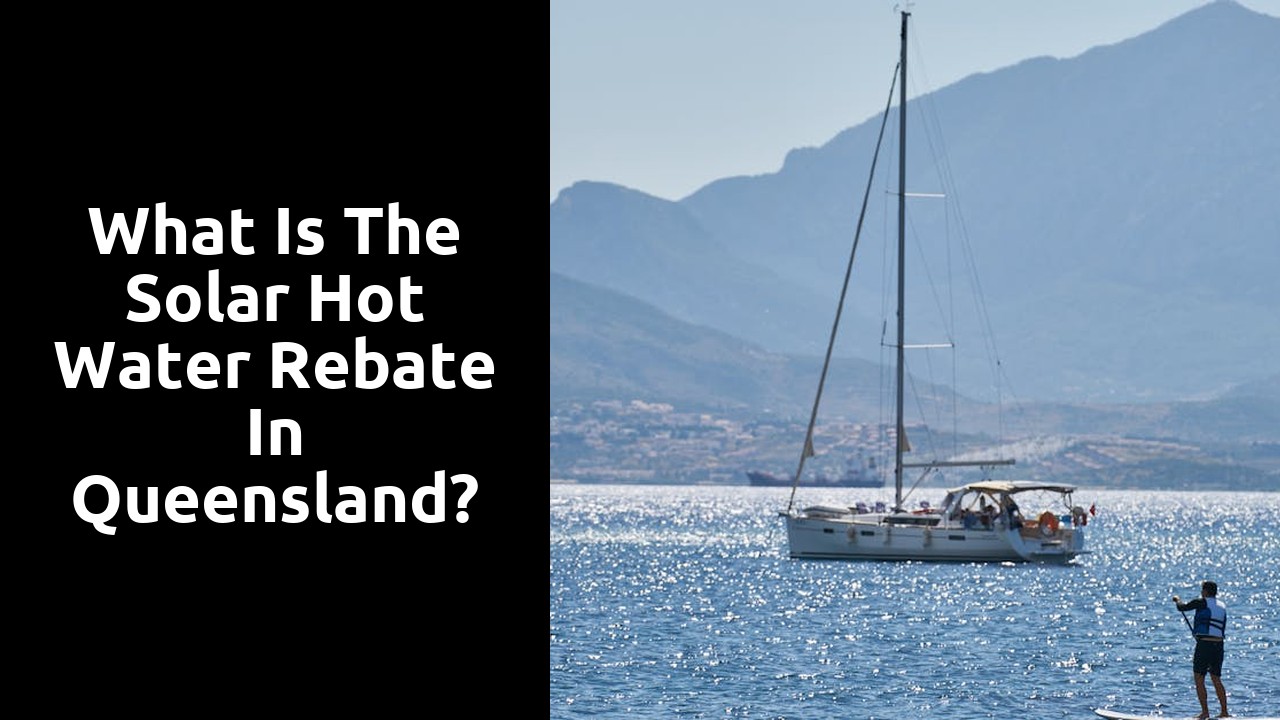
Maximizing the Rebate Value
When considering ways to make the most out of the federal government rebate for solar hot water systems, it is essential to focus on key factors that can help you maximize the value of the incentive. One key aspect is to engage in Solar Hot Water System Education and Training to understand the requirements and guidelines for claiming the rebate successfully. By educating yourself on the specific criteria and necessary steps, you can ensure that your application meets all the necessary conditions for approval. Additionally, staying informed about any updates or changes to the rebate program through reliable sources can aid in streamlining the process and optimizing the value of the rebate.
Moreover, seeking professional advice and guidance from experts in the field of solar hot water systems can provide valuable insights on how to best align your system with the rebate requirements. Consulting with reputable installers and industry professionals can offer tailored recommendations to help you achieve maximum efficiency and performance from your solar hot water system. By leveraging the knowledge and expertise of individuals who specialise in renewable energy solutions, you can make informed decisions that lead to significant savings and benefits in the long run.
Additional Incentives and Funding Programs
In addition to the federal government rebate for solar hot water systems, there are other incentives and funding programs available to further support the adoption of renewable energy. These programs aim to encourage households and businesses to invest in sustainable solutions and reduce their carbon footprint. Some state and local governments offer additional rebates or incentives for installing solar hot water systems, making it more affordable for consumers to embrace eco-friendly technologies. Furthermore, various funding programs provide financial assistance to eligible applicants, ensuring that the transition to solar hot water is accessible to a wider range of individuals and organisations. Solar Hot Water System Education and Training play a crucial role in informing the public about these incentives and funding opportunities, empowering them to make informed decisions about their energy usage and environmental impact.
Maintenance Tips for Optimal Performance
Maintaining your solar hot water system is crucial for ensuring optimal performance and longevity. Regular inspection of the system, including the solar panels and storage tank, is recommended to detect any potential issues early on. It's also essential to keep an eye on the temperature and pressure levels to prevent any overheating or malfunctions. Performing simple checks and cleaning tasks can go a long way in maximising the efficiency of your system.
Additionally, investing in Solar Hot Water System Education and Training can provide valuable insights into proper system maintenance and troubleshooting techniques. By staying informed and knowledgeable about your system, you can address minor problems promptly and avoid costly repairs in the future. Regularly updating your skills and understanding the technical aspects of solar hot water systems can help you make the most of your investment and enjoy sustainable energy savings.
Ensuring Longevity and Efficiency of the System
Ensuring the longevity and efficiency of your solar hot water system is crucial for optimal performance and cost savings. Regular maintenance is key to extending the system's lifespan and ensuring it operates at peak efficiency. It is recommended to schedule annual inspections by a qualified technician to check for any potential issues and conduct necessary repairs or replacements.
Moreover, investing in Solar Hot Water System Education and Training for yourself or the individuals responsible for system maintenance can provide valuable knowledge on how to properly care for and troubleshoot the system. Proper education can help in identifying any early signs of deterioration and addressing them promptly, ultimately prolonging the life of your solar hot water system and maximising its energy efficiency.
Common Misconceptions About Solar Hot Water Rebates
Many consumers believe that receiving a federal government rebate for installing a solar hot water system is a cumbersome process that requires extensive paperwork and approval delays. However, the reality is that the rebate application process has been streamlined to make it more user-friendly and efficient. By actively engaging in Solar Hot Water System Education and Training, individuals can familiarize themselves with the application requirements and submission procedures, thereby dispelling the misconception that obtaining a rebate is a daunting task.
Another common misconception surrounding solar hot water rebates is that only homeowners are eligible to receive financial incentives for installing a solar hot water system. Contrary to this belief, both homeowners and renters can benefit from the federal government rebate, provided they meet the specified criteria. By raising awareness about the inclusion of renters in the rebate program through platforms such as Solar Hot Water System Education and Training, misconceptions about eligibility requirements can be addressed, leading to a more informed and empowered consumer base.
Debunking Myths and Clarifying Rebate Terms
There is a common misconception that the federal government rebate for solar hot water systems is only available for new installations. However, it is important to clarify that the rebate can also be claimed for retrofitting existing hot water systems with solar technology. This means that homeowners looking to upgrade their current water heating setup can still benefit from the rebate program. Therefore, it is crucial for consumers to be aware of the eligibility criteria to make the most of the financial incentives provided by the government.
Another myth surrounding solar hot water rebates is the notion that the process of claiming the rebate is overly complicated and time-consuming. In reality, with the right guidance and understanding of the terms and conditions, applying for the rebate can be a straightforward process. By staying informed and seeking assistance when needed, homeowners can navigate the rebate application with confidence and ensure a smooth transition to a more sustainable and cost-effective water heating solution. This highlights the importance of Solar Hot Water System Education and Training to empower consumers with the knowledge needed to make informed decisions about their energy consumption.
FAQS
What is the federal government rebate for solar hot water?
The federal government rebate for solar hot water is a financial incentive provided to encourage the installation of solar hot water systems in Australian households.
How can I maximize the rebate value for my solar hot water system?
To maximize the rebate value for your solar hot water system, ensure that you meet all the eligibility criteria, such as using a Clean Energy Council (CEC) accredited installer and choosing a system that meets the required standards.
Are there any additional incentives and funding programs available for solar hot water systems?
Yes, apart from the federal government rebate, there are often state-based incentives and funding programs available for solar hot water systems. It's advisable to check with your local government or relevant authorities for more information.
What are some maintenance tips for optimal performance of a solar hot water system?
To ensure optimal performance of your solar hot water system, regular maintenance is essential. This includes checking for leaks, ensuring proper insulation, and scheduling professional servicing when needed.
How can I ensure the longevity and efficiency of my solar hot water system?
To ensure the longevity and efficiency of your solar hot water system, it's important to follow the manufacturer's maintenance guidelines, monitor system performance regularly, and address any issues promptly to prevent further damage.
What are some common misconceptions about solar hot water rebates?
Some common misconceptions about solar hot water rebates include the belief that the process is complicated, that only certain types of systems qualify, and that the rebate amount is insignificant.
How can I debunk myths and clarify the terms of solar hot water rebates?
To debunk myths and clarify the terms of solar hot water rebates, it's recommended to refer to official government websites or consult with reputable solar energy providers who can provide accurate information and guidance.
